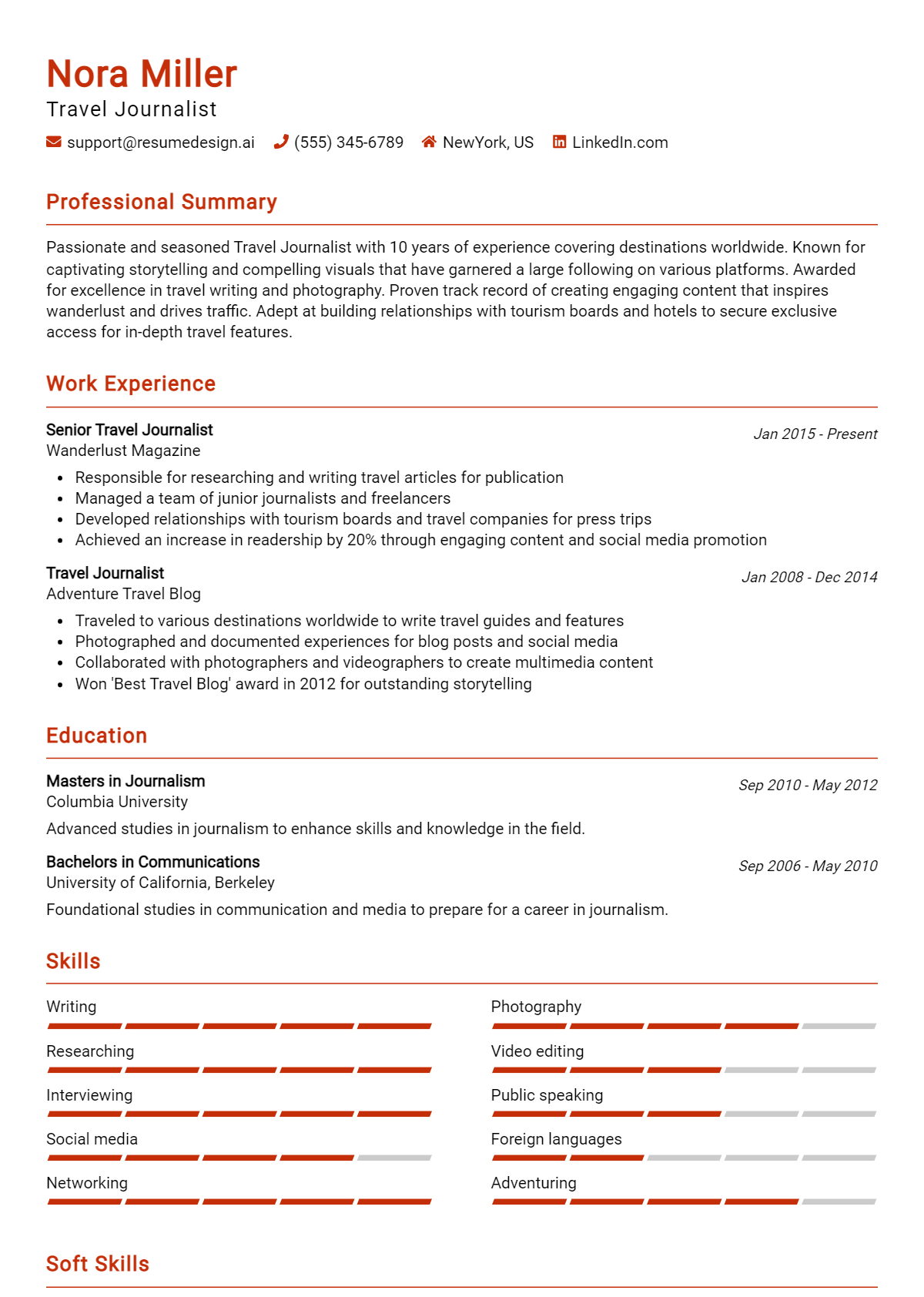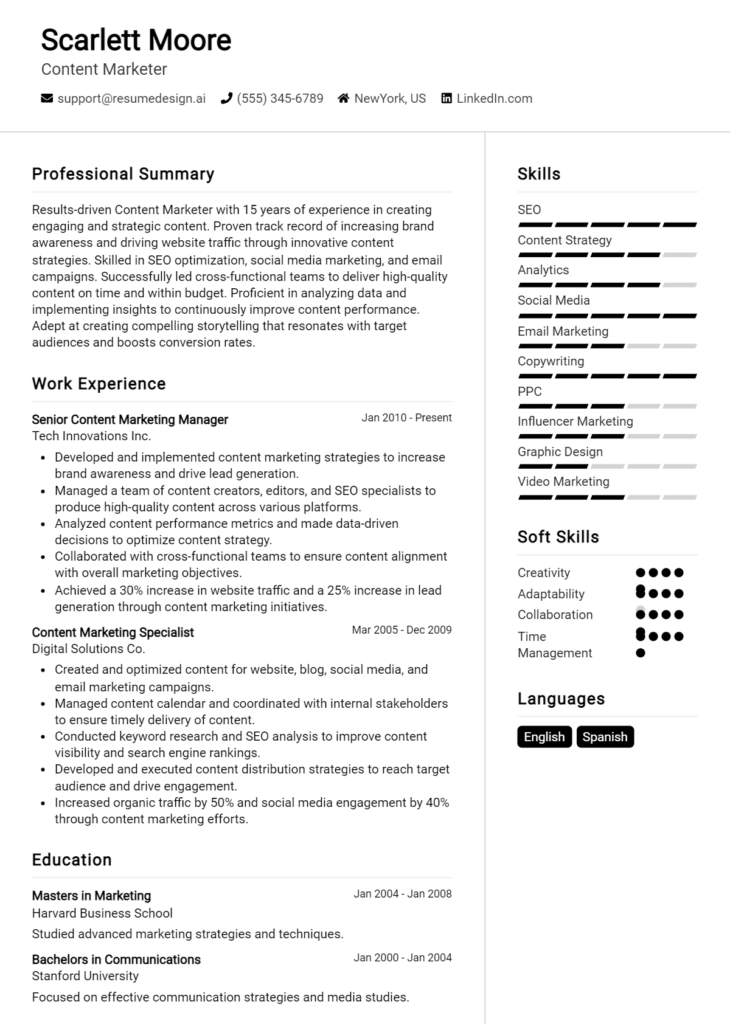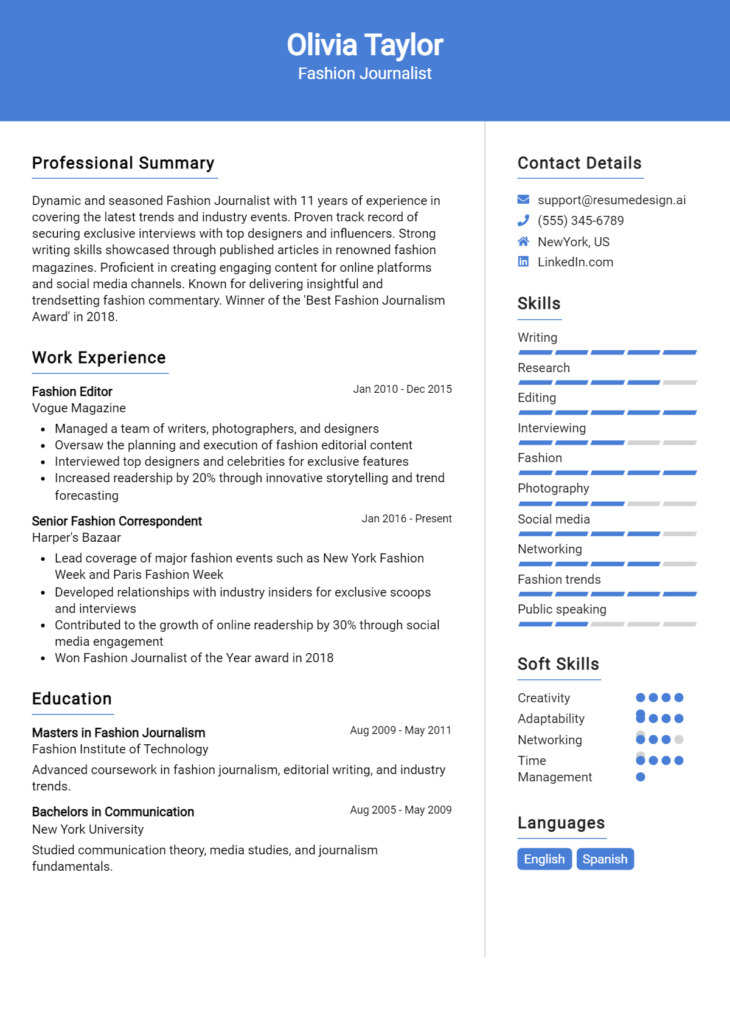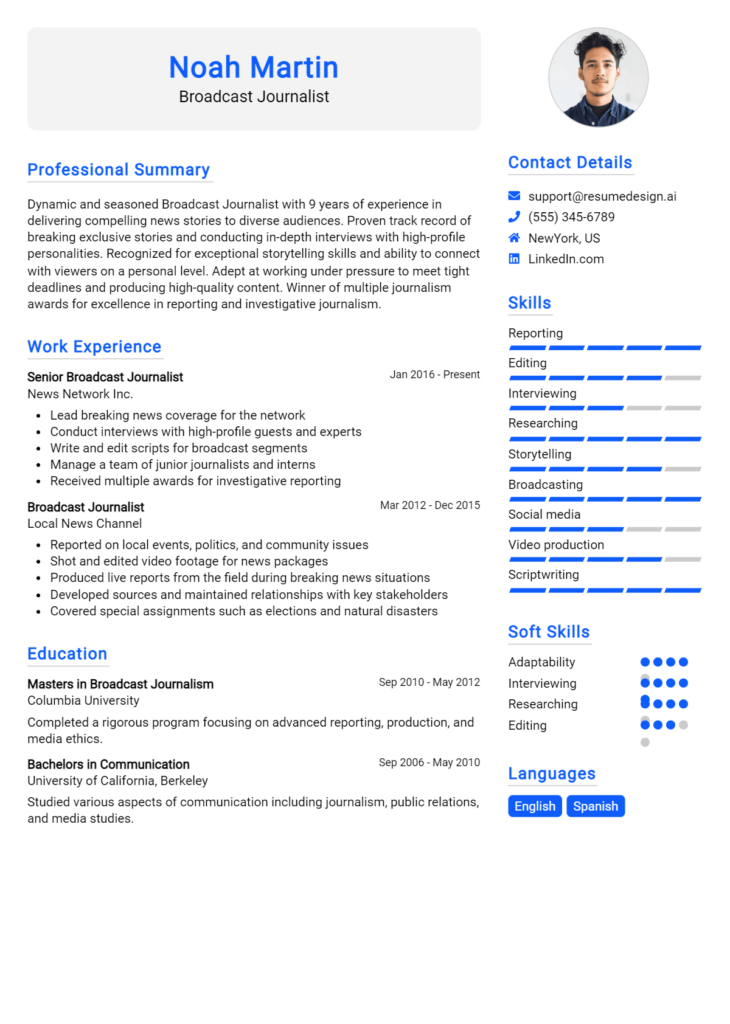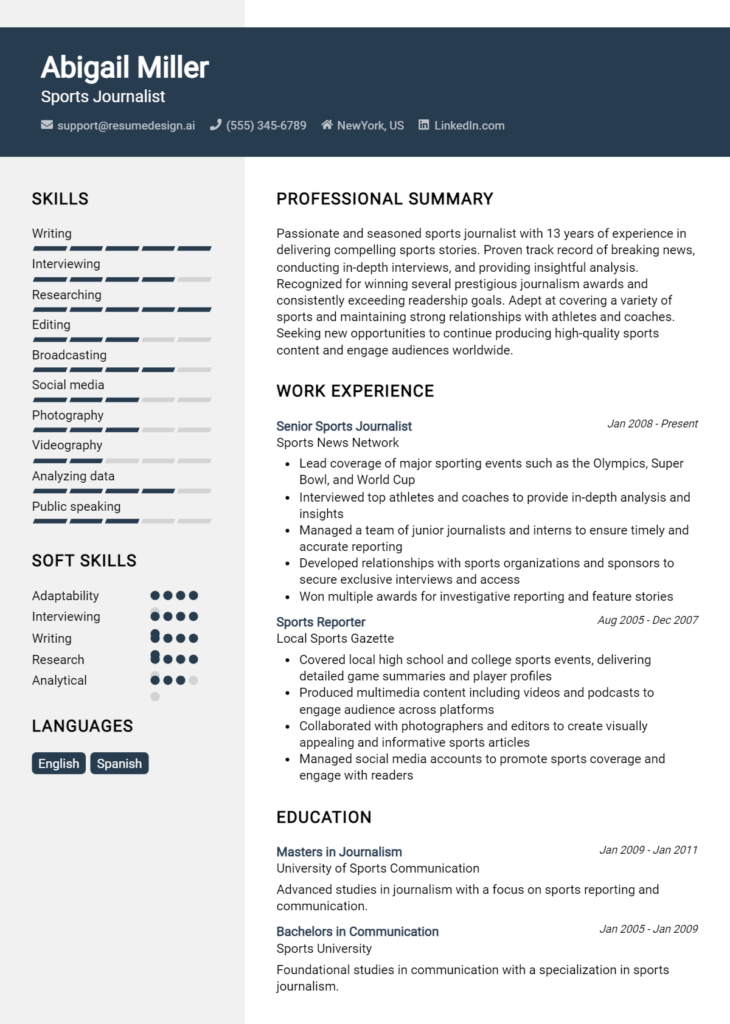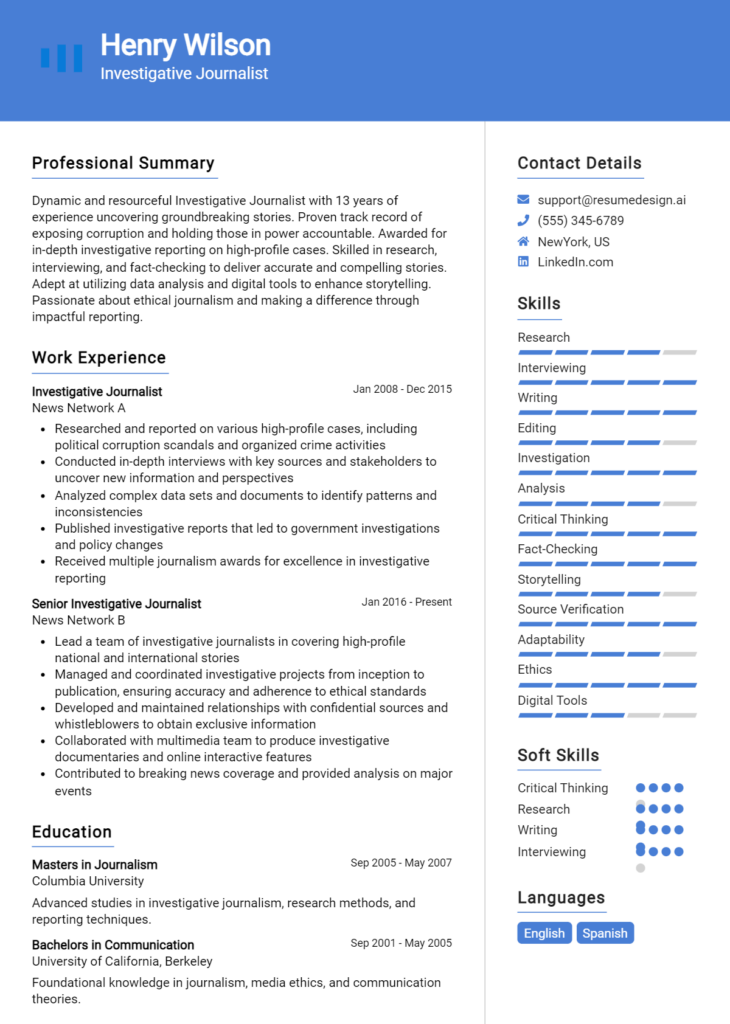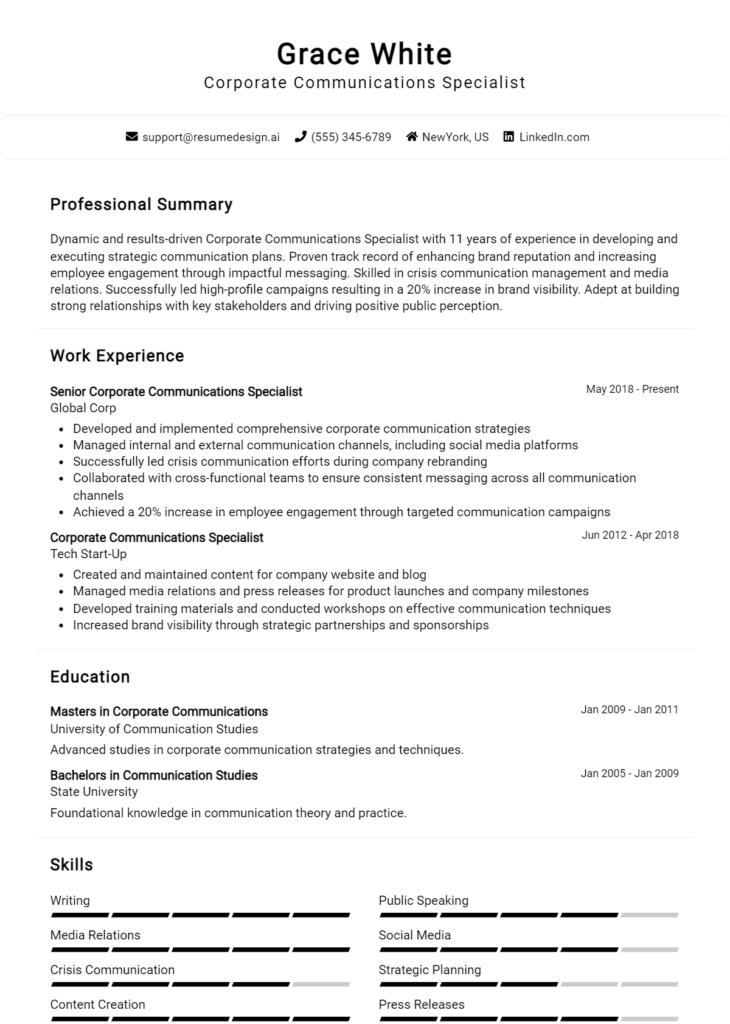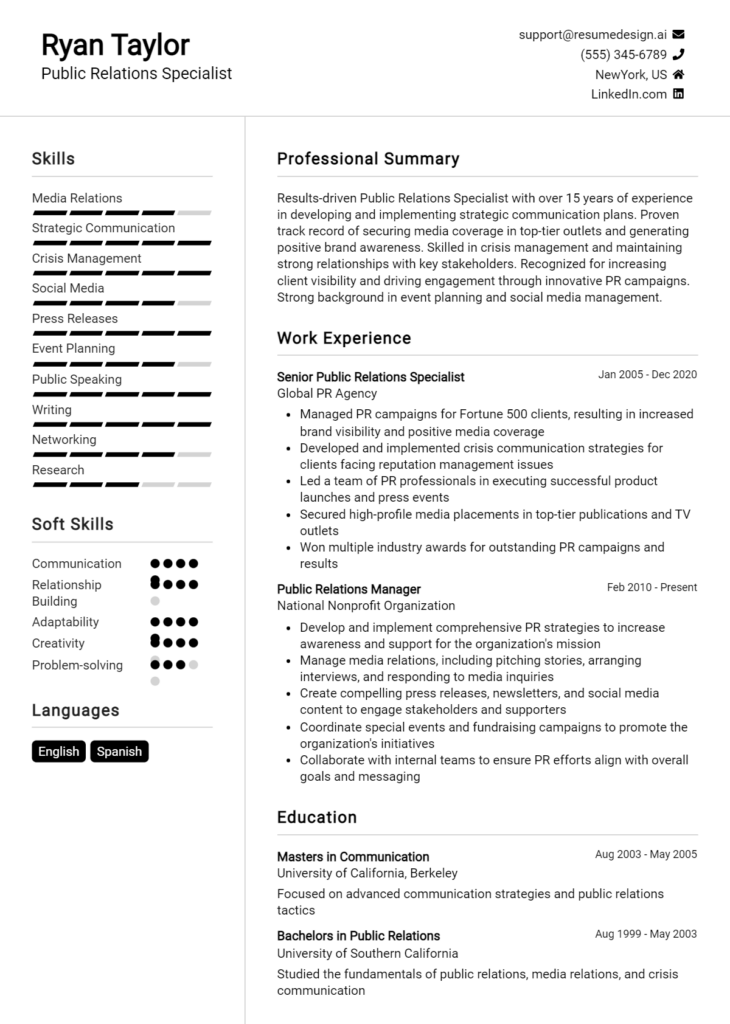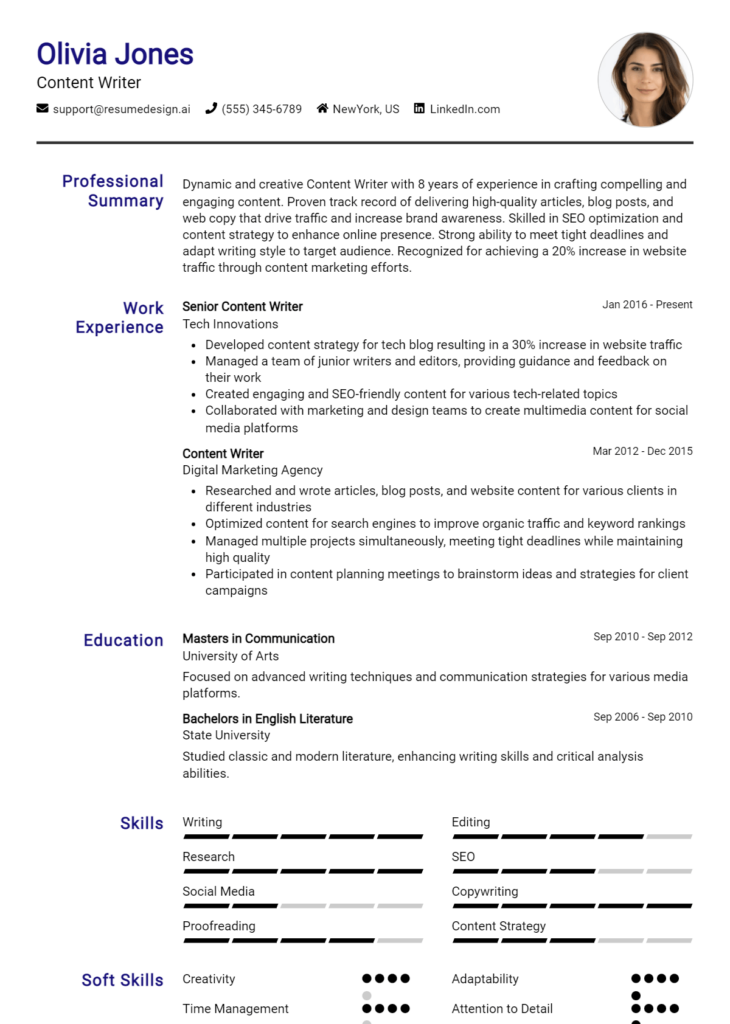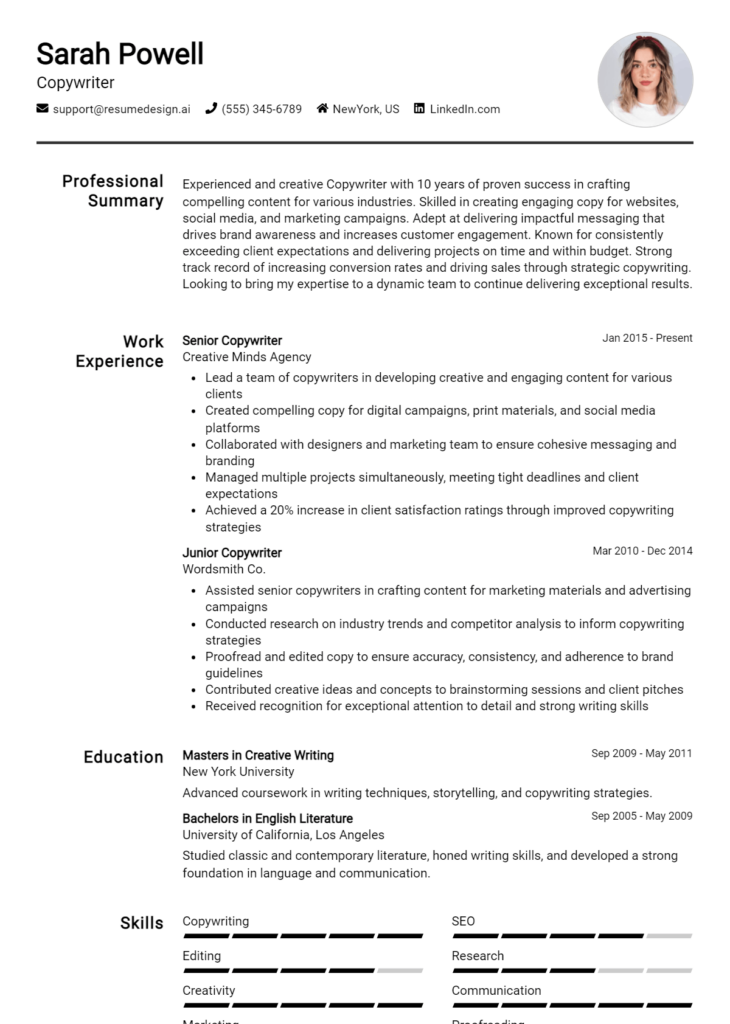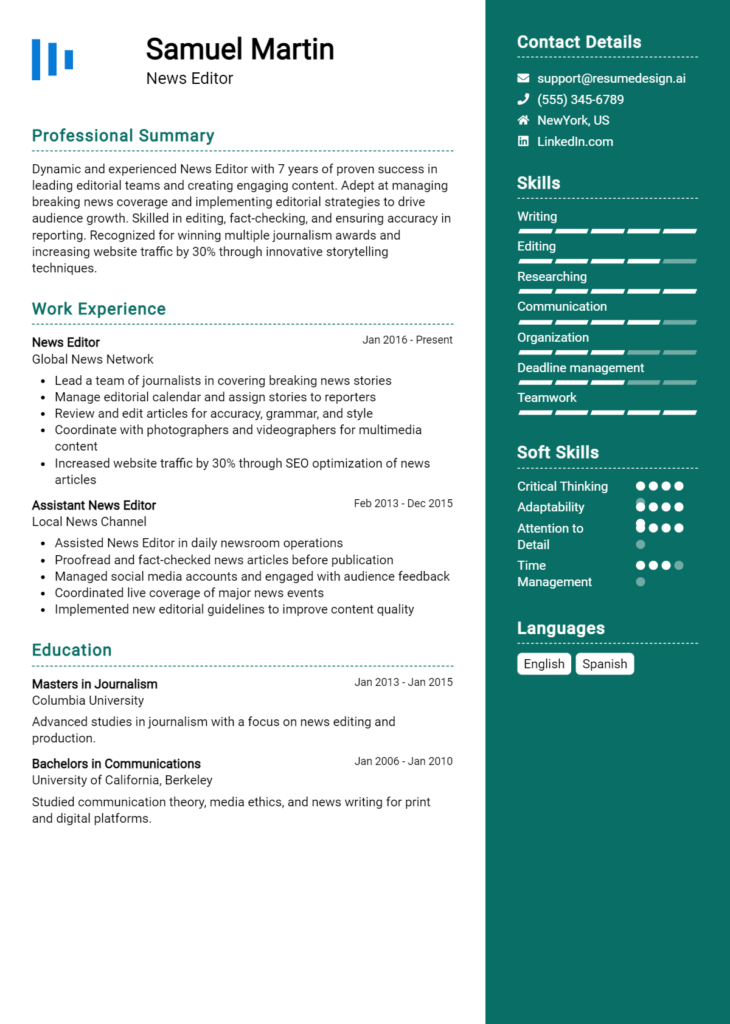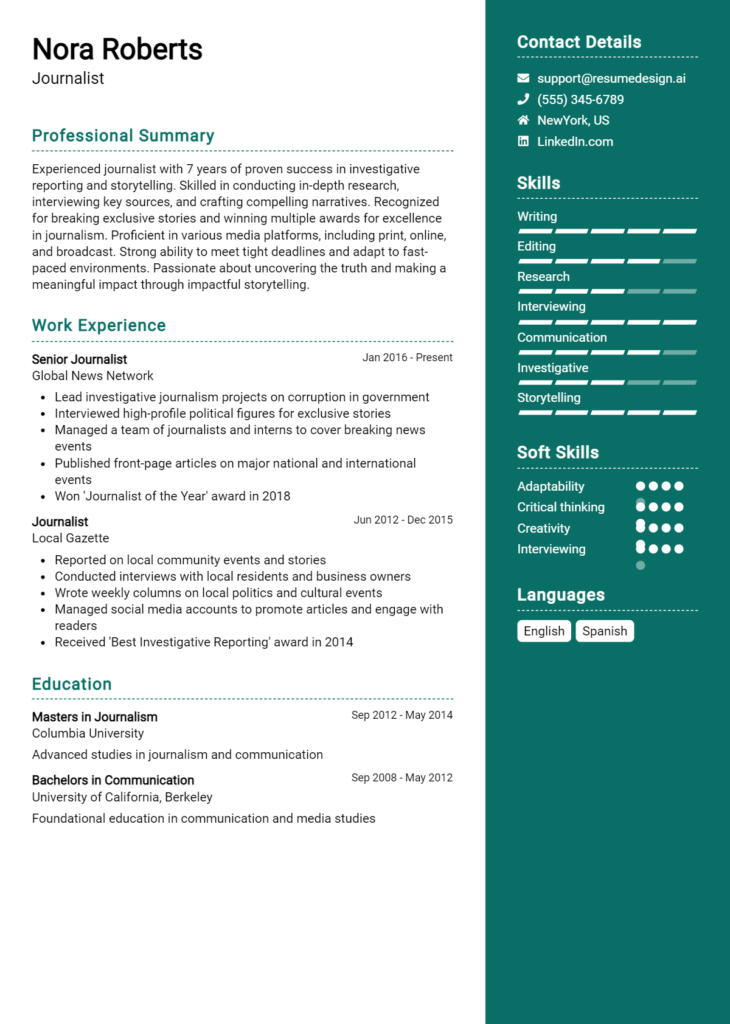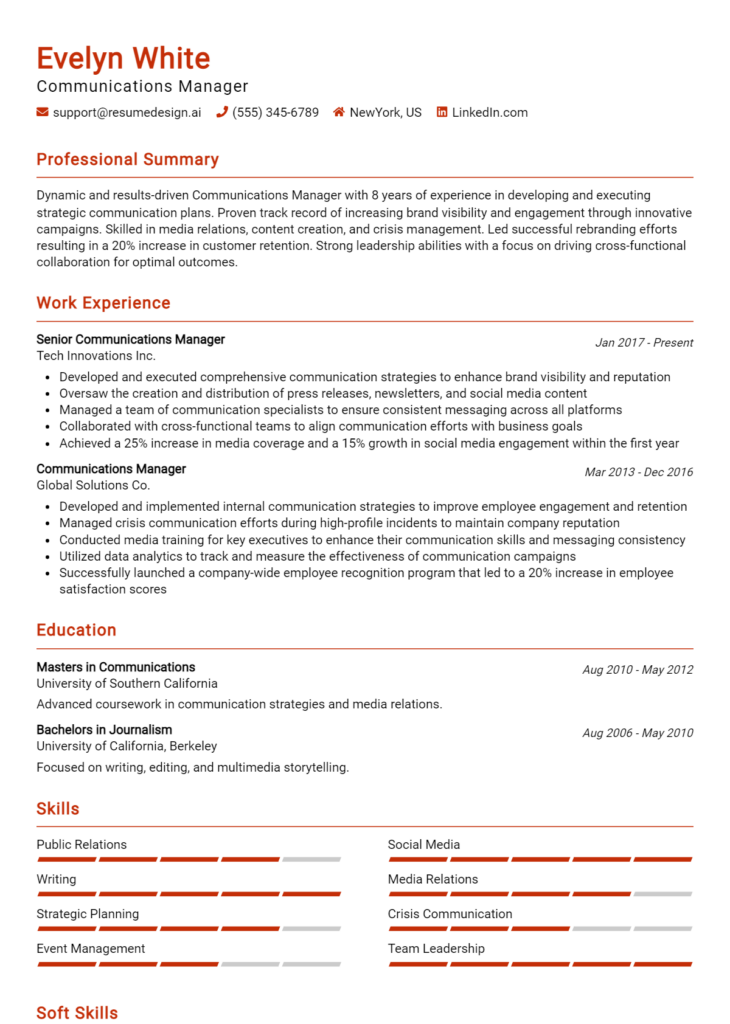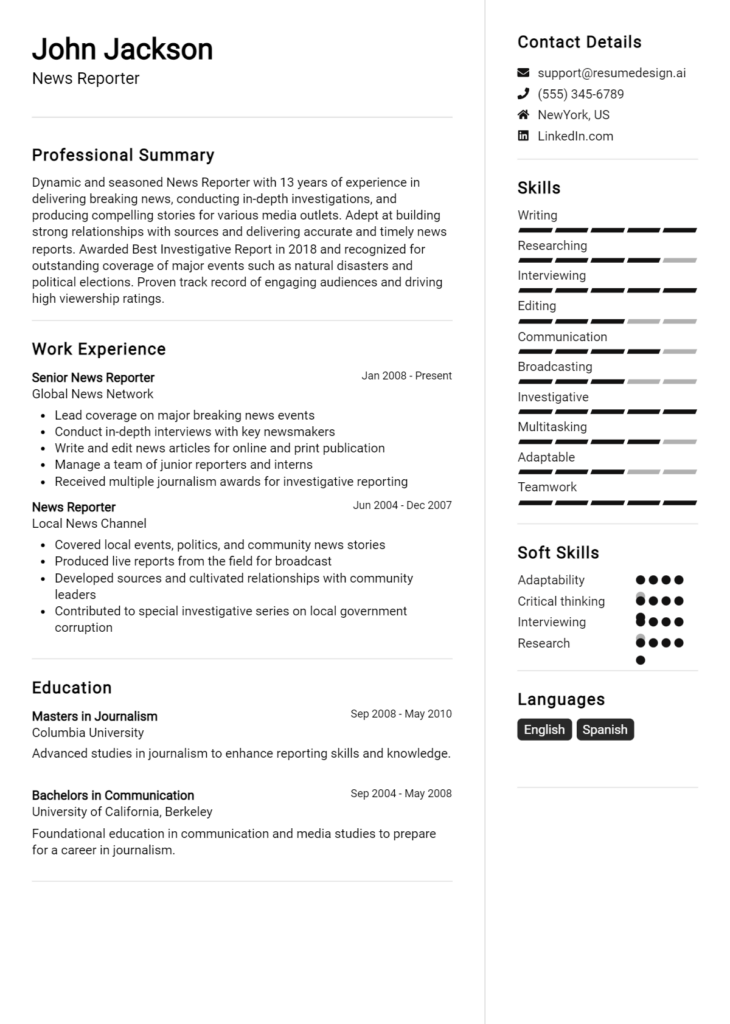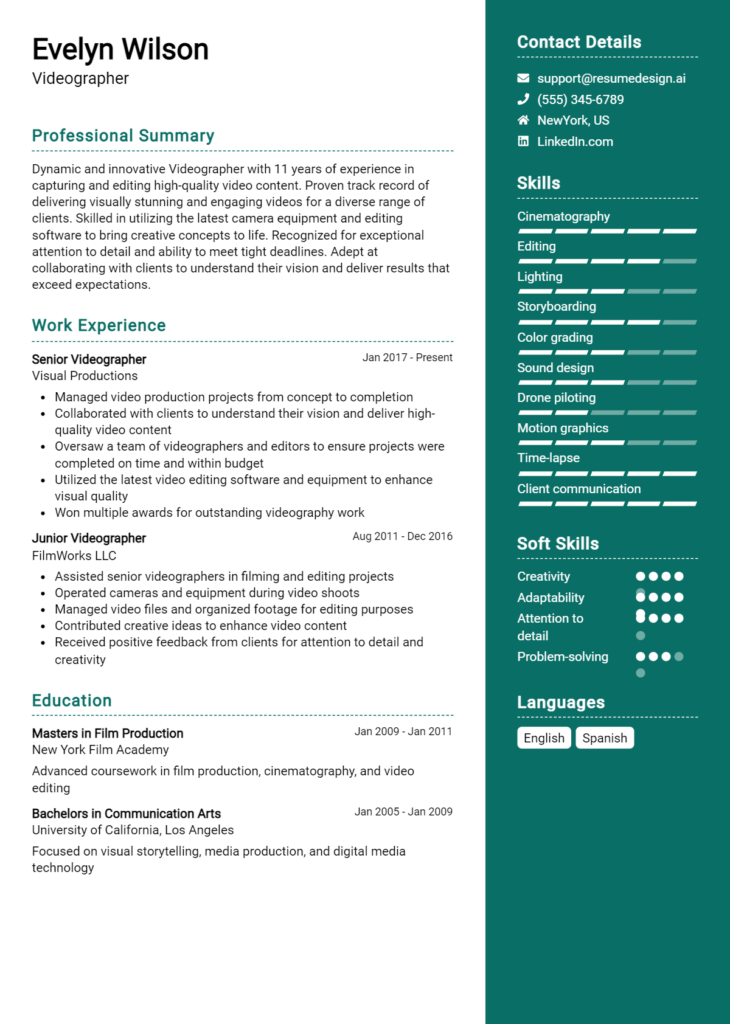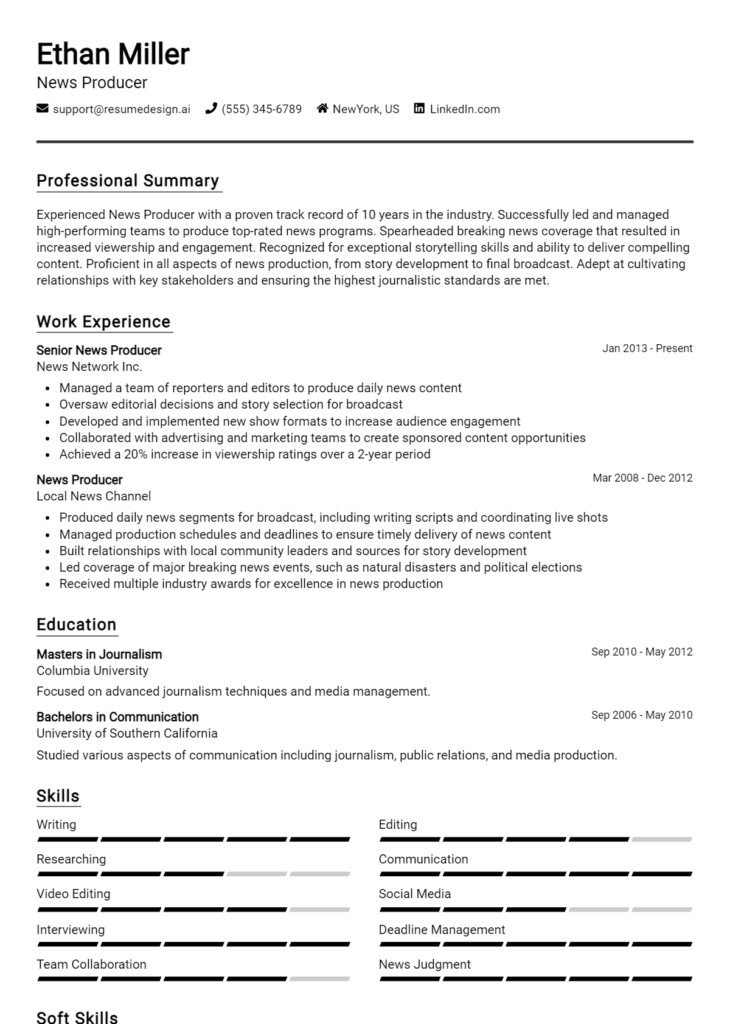Travel Journalist Core Responsibilities
A Travel Journalist plays a vital role in bridging the gap between storytelling, marketing, and cultural exploration. Their core responsibilities include researching destinations, conducting interviews, and crafting engaging narratives that captivate audiences. Essential skills encompass technical abilities for multimedia content creation, operational expertise in logistics, and strong problem-solving capabilities to navigate challenges on the road. These skills not only contribute to the organization's goals of audience engagement and brand promotion but also emphasize the importance of a well-structured resume to effectively showcase these qualifications and experiences.
Common Responsibilities Listed on Travel Journalist Resume
- Researching and writing articles on travel destinations and experiences.
- Conducting interviews with locals, travelers, and industry professionals.
- Creating multimedia content, including videos and podcasts.
- Collaborating with editors and marketing teams to align content strategies.
- Managing social media accounts to promote travel content.
- Attending press trips and travel events for firsthand experiences.
- Developing relationships with tourism boards and travel companies.
- Editing and proofreading content for clarity and accuracy.
- Staying updated on travel trends and news.
- Utilizing SEO best practices to enhance online visibility.
- Adapting content for various formats and platforms.
- Providing insights and recommendations based on travel experiences.
High-Level Resume Tips for Travel Journalist Professionals
In the competitive realm of travel journalism, a well-crafted resume is your passport to opportunity. It's the first impression you'll make on potential employers, and it needs to effectively showcase your unique skills, experiences, and achievements in a way that captivates their attention. A compelling resume not only reflects your qualifications but also tells the story of your passion for travel and storytelling. This guide will offer practical and actionable resume tips specifically tailored for travel journalists, helping you stand out in a crowded field and land that dream position.
Top Resume Tips for Travel Journalist Professionals
- Tailor your resume for each job application by closely reviewing the job description and aligning your skills and experiences with the requirements.
- Showcase relevant experience by including internships, freelance work, and travel writing assignments that highlight your ability to report on diverse destinations.
- Quantify your achievements by including metrics, such as the number of articles published, audience reach, or engagement statistics, to demonstrate your impact.
- Highlight industry-specific skills like photography, video editing, SEO, and social media management that are essential for modern travel journalism.
- Include a portfolio link to your published work or a personal blog, showcasing your writing style and versatility in covering various travel topics.
- Utilize action verbs in your descriptions to convey a sense of impact and engagement, such as "explored," "documented," and "narrated."
- Incorporate any relevant certifications or training, such as courses in journalism, travel writing, or digital media, to bolster your credibility.
- Keep your resume concise, ideally one page, focusing on the most relevant experiences and skills that align with the travel journalism field.
- Highlight language skills, especially if you have proficiency in multiple languages, as this can enhance your appeal for international assignments.
By implementing these tips, you can significantly increase your chances of landing a job in the travel journalism field. A targeted and polished resume will not only reflect your qualifications but also convey your enthusiasm and commitment to the profession, making you a strong candidate in a competitive marketplace.
Why Resume Headlines & Titles are Important for Travel Journalist
In the competitive world of travel journalism, a well-crafted resume headline or title is crucial for capturing the attention of hiring managers. A strong headline serves as a snapshot of a candidate's key qualifications, instantly summarizing their unique selling points in a concise and impactful manner. In an industry where storytelling is paramount, the ability to communicate effectively from the very first line of a resume can make all the difference. A headline that is relevant and directly related to the job being applied for not only sets the tone for the rest of the resume but also positions the candidate as a strong contender in a crowded field.
Best Practices for Crafting Resume Headlines for Travel Journalist
- Keep it concise: Aim for one impactful phrase that encapsulates your qualifications.
- Be role-specific: Tailor your headline to match the specific travel journalism position you are applying for.
- Highlight key strengths: Focus on your most relevant skills or experiences that align with the job description.
- Use powerful language: Choose action-oriented words that convey confidence and expertise.
- Avoid jargon: Use clear and straightforward language that can be easily understood by hiring managers.
- Consider your audience: Think about what would grab the attention of editors or travel companies looking for journalists.
- Showcase accomplishments: If applicable, incorporate any significant achievements that demonstrate your capabilities.
- Stay genuine: Reflect your true strengths and experiences to maintain authenticity.
Example Resume Headlines for Travel Journalist
Strong Resume Headlines
Award-Winning Travel Journalist Specializing in Sustainable Tourism
Experienced Travel Writer with a Passion for Cultural Exploration
Dynamic Travel Journalist with 10+ Years of Global Reporting Experience
Engaging Storyteller and Travel Enthusiast Committed to Authentic Narratives
Weak Resume Headlines
Just Another Travel Writer
Seeking Opportunities in Travel Journalism
The strong resume headlines are effective because they are specific, engaging, and directly related to the role of a travel journalist. They convey not only expertise but also passion, which is essential in this field. In contrast, the weak headlines fail to impress due to their vagueness and lack of distinction. They do not provide any insight into the candidate's strengths or experiences, making it difficult for hiring managers to see why they would be a good fit for the position. A strong headline serves as a powerful first impression, while a weak one leaves much to be desired.
Writing an Exceptional Travel Journalist Resume Summary
A well-crafted resume summary is crucial for a Travel Journalist as it serves as the first impression for hiring managers. This brief introduction allows candidates to highlight their most pertinent skills, experiences, and accomplishments right at the top of their resumes, making it easy for employers to quickly gauge their fit for the role. A strong summary should be concise yet impactful, tailored to the specific job being applied for, and should effectively showcase the candidate's unique qualifications, setting the stage for a deeper dive into their professional history.
Best Practices for Writing a Travel Journalist Resume Summary
- Quantify Achievements: Use numbers and statistics to demonstrate the impact of your work, such as audience reach or published articles.
- Focus on Relevant Skills: Highlight specific skills that are directly applicable to the travel journalism field, such as writing, photography, or digital marketing.
- Tailor the Summary: Customize your summary to align with the job description, using keywords that match the employer's requirements.
- Keep it Concise: Aim for 2-4 sentences that encapsulate your qualifications without overwhelming the reader.
- Showcase Unique Experiences: Mention unique travel experiences or stories that set you apart from other candidates.
- Use Action-Oriented Language: Start sentences with powerful action verbs to convey your accomplishments effectively.
- Highlight Awards or Recognition: Include any accolades or recognitions that validate your expertise in travel journalism.
- Emphasize Adaptability: Showcase your ability to adapt to different cultures or environments, which is critical in travel journalism.
Example Travel Journalist Resume Summaries
Strong Resume Summaries
Dynamic Travel Journalist with over 8 years of experience in exploring and documenting diverse cultures across 30 countries. Published articles in top-tier travel magazines, reaching an audience of over 500,000 readers. Proven ability to engage audiences through compelling narrative and photography, resulting in a 25% increase in readership for featured articles.
Award-winning Travel Writer skilled in crafting immersive travel narratives and digital content. Successfully managed a personal travel blog that garnered 100,000 monthly visitors and partnered with major brands for sponsored content. Experienced in SEO techniques that improved article visibility by 40%.
Versatile Travel Journalist with a passion for uncovering hidden gems around the globe. Authored over 200 articles for leading travel publications and recognized with the Travel Writers Association award in 2022 for Best Destination Feature. Strong background in photography and social media marketing.
Weak Resume Summaries
Experienced writer with a focus on travel. I have written many articles and enjoy traveling.
I am a travel journalist who likes to explore different places and write about them. I have some experience in the field.
The strong resume summaries are effective because they provide specific achievements, quantify results, and highlight relevant skills that directly correlate with the travel journalism role. They use compelling language and demonstrate a clear understanding of the industry. In contrast, the weak summaries are vague and lack measurable outcomes, making it difficult for hiring managers to understand the candidate's qualifications or the value they could bring to the position.
Work Experience Section for Travel Journalist Resume
The work experience section of a Travel Journalist resume is crucial as it serves as a testament to the candidate's technical skills, teamwork, and ability to deliver compelling narratives that resonate with readers. This section not only highlights previous employment and roles but also showcases the candidate's proficiency in research, writing, and multimedia storytelling. By quantifying achievements—such as audience growth, engagement metrics, or successful project completions—and aligning their experience with industry standards, candidates can effectively demonstrate their value to potential employers in a competitive field.
Best Practices for Travel Journalist Work Experience
- Highlight relevant technical skills such as photography, videography, and editing software proficiency.
- Include quantifiable results, such as increased readership or audience engagement metrics.
- Demonstrate collaborative efforts by mentioning teamwork in projects, such as co-authoring articles or working with editors.
- Use action verbs to convey impact and leadership in your roles.
- Focus on industry-standard practices and tools that align with the expectations of employers.
- Tailor your experience descriptions to highlight achievements that are relevant to the specific job you are applying for.
- Incorporate feedback and results from editors or clients to showcase the quality of your work.
- Maintain a clear and concise format for readability, making it easy for hiring managers to assess your experience quickly.
Example Work Experiences for Travel Journalist
Strong Experiences
- Produced a travel series that increased the publication's online traffic by 30% within six months, demonstrating effective content strategy and audience engagement.
- Led a team of five journalists to cover a major international event, resulting in award-winning coverage that reached over 1 million readers.
- Implemented a social media campaign that boosted follower engagement by 50%, showcasing the integration of digital marketing with traditional journalism.
- Co-authored a travel guidebook that was featured in major travel magazines, contributing to an increase in book sales by 40% in the first quarter.
Weak Experiences
- Wrote articles for a travel blog.
- Worked with a team on various projects.
- Participated in travel-related events.
- Assisted in editing travel content.
The examples provided illustrate a clear distinction between strong and weak experiences. Strong experiences are characterized by specific, quantifiable outcomes and demonstrate leadership, collaboration, and technical expertise. They provide concrete evidence of the candidate's impact and contributions to projects. In contrast, weak experiences lack detail and measurable results, making it difficult for potential employers to assess the candidate's true capabilities and value in the travel journalism field.
Education and Certifications Section for Travel Journalist Resume
The education and certifications section of a Travel Journalist resume is crucial as it showcases the candidate's academic background and industry-relevant qualifications. This segment not only reflects the journalist's foundational knowledge but also underscores their commitment to continuous learning and professional development. By including relevant coursework, certifications, and specialized training, candidates can significantly enhance their credibility and demonstrate their alignment with the demands of the travel journalism field. This section serves to assure potential employers of the candidate's preparedness and expertise in delivering insightful, accurate, and engaging travel content.
Best Practices for Travel Journalist Education and Certifications
- Prioritize relevant degrees in journalism, communications, or related fields.
- Include industry-recognized certifications, such as travel writing or digital media.
- List any specialized training or workshops that enhance your travel journalism skills.
- Provide details on relevant coursework that directly relates to travel writing or reporting.
- Highlight any internships or hands-on experiences in travel journalism or related industries.
- Keep the section concise while ensuring all entries are meaningful and applicable to the role.
- Update the section regularly to reflect new qualifications and ongoing education.
- Use clear formatting to ensure easy readability and quick reference for hiring managers.
Example Education and Certifications for Travel Journalist
Strong Examples
- Bachelor of Arts in Journalism, University of California, Los Angeles
- Certification in Travel Writing from the Travel Writers’ Academy
- Completed coursework in Digital Content Creation and Multimedia Storytelling
- Certificate in Social Media Marketing for Travel Professionals
Weak Examples
- Associate Degree in General Studies, Community College
- Certification in Basic Computer Skills (not relevant to travel journalism)
- High School Diploma with no mention of relevant coursework or extracurricular activities
- Outdated certification in Traditional Journalism from 2010
The strong examples presented are aligned with the requirements of a Travel Journalist, showcasing relevant degrees, certifications, and coursework that enhance the candidate's qualifications for the role. These entries reflect current industry standards and demonstrate a commitment to the field. In contrast, the weak examples illustrate qualifications that either lack relevance to travel journalism or are outdated, which may lead potential employers to question the candidate's suitability and preparedness for a career in this dynamic field.
Top Skills & Keywords for Travel Journalist Resume
In the competitive field of travel journalism, having the right skills is essential for standing out in your resume. A well-crafted resume that highlights both soft and hard skills can significantly enhance your chances of landing an interview. As a travel journalist, you need to convey your ability to capture compelling narratives, adapt to diverse environments, and engage with different cultures. Additionally, showcasing your technical proficiencies, such as photography and digital content creation, adds value to your candidacy. By strategically incorporating relevant skills into your resume, you can effectively demonstrate your qualifications and passion for travel journalism.
Top Hard & Soft Skills for Travel Journalist
Soft Skills
- Excellent communication
- Creative storytelling
- Adaptability
- Cultural sensitivity
- Networking ability
- Research proficiency
- Time management
- Problem-solving
- Critical thinking
- Detail-oriented
Hard Skills
- Photography and videography
- SEO and digital marketing
- Writing and editing
- Social media management
- Data analysis for travel trends
- Knowledge of travel regulations and safety
- Proficiency in content management systems (CMS)
- Graphic design basics
- Foreign language proficiency
- Familiarity with blogging platforms
By emphasizing these skills in your resume alongside your relevant work experience, you can create a compelling narrative that showcases why you are the ideal candidate for a travel journalism role.
Stand Out with a Winning Travel Journalist Cover Letter
As a passionate traveler and seasoned writer, I am excited to apply for the Travel Journalist position at [Company Name]. With over five years of experience in the travel writing industry, I have honed my skills in storytelling, research, and photography, allowing me to create compelling narratives that resonate with readers. My journeys across six continents have not only enriched my perspective but also provided me with a wealth of authentic experiences that I am eager to share with your audience.
In my previous role at [Previous Company Name], I successfully crafted engaging articles that highlighted diverse cultures, stunning landscapes, and unique travel tips. My ability to weave personal anecdotes with factual information enables me to connect deeply with readers, inspiring them to explore new destinations. I have also collaborated with various brands and tourism boards, showcasing my ability to produce high-quality content that meets both editorial standards and marketing objectives. My work has been published in reputable travel magazines and online platforms, garnering a loyal following and positive feedback from my audience.
What sets me apart as a travel journalist is my dedication to authenticity and cultural sensitivity. I believe that travel journalism should not only entertain but also educate and advocate for responsible tourism. I strive to shed light on local communities, promote sustainable practices, and highlight lesser-known destinations that deserve recognition. I am particularly drawn to [Company Name] because of your commitment to ethical travel and storytelling, and I am eager to contribute my unique voice to your esteemed publication.
I am excited about the opportunity to collaborate with your talented team and bring fresh perspectives to your travel coverage. Thank you for considering my application. I look forward to the possibility of discussing how my experiences and passion for travel can contribute to the ongoing success of [Company Name].
Common Mistakes to Avoid in a Travel Journalist Resume
When crafting a resume as a travel journalist, it's essential to present your skills and experiences in a compelling manner. However, many aspiring travel writers make common mistakes that can undermine their chances of landing an interview. An effective resume should not only reflect your passion for travel and storytelling but also demonstrate your professionalism and attention to detail. Here are some common pitfalls to avoid when creating your travel journalist resume:
Lack of Tailoring: Failing to customize your resume for each job application can make you seem uninterested. Always align your skills and experiences with the specific requirements of the job you’re applying for.
Ignoring Keywords: Not incorporating relevant keywords from the job description can lead to your resume being overlooked by Applicant Tracking Systems (ATS). Make sure to include industry-specific terms and phrases.
Overloading with Jargon: While showcasing your expertise is important, using too much technical jargon can confuse hiring managers. Aim for clear and accessible language that conveys your qualifications effectively.
Neglecting Achievements: Simply listing job duties without highlighting your achievements can weaken your resume. Focus on quantifiable successes, such as the number of articles published or audience engagement metrics.
Inconsistent Formatting: A cluttered or inconsistent resume layout can distract from your content. Ensure your formatting is uniform and easy to read, using clear headings and bullet points for organization.
Using a Generic Objective Statement: A vague objective statement can make your resume blend in with the crowd. Instead, opt for a specific summary that clearly defines your career goals and what you bring to the role.
Overemphasizing Travel Experience: While travel experience is relevant, overemphasizing it at the expense of your writing skills can be misleading. Balance your travel background with strong examples of your writing and reporting abilities.
Neglecting Proofreading: Spelling and grammatical errors can severely impact your credibility. Always proofread your resume multiple times and consider having someone else review it to catch any mistakes.
Conclusion
As we have explored the dynamic and exciting world of travel journalism, it’s clear that this career offers a unique blend of adventure and storytelling. We discussed the essential skills required, including excellent writing abilities, a keen eye for detail, and the capacity to connect with diverse cultures. The importance of networking with other journalists and building a portfolio of published work was also highlighted as crucial steps to establish credibility in this competitive field.
Moreover, we examined how travel journalists can leverage social media and digital platforms to enhance their visibility and engage with their audience effectively. Understanding the nuances of different travel niches—be it luxury, eco-tourism, or adventure travel—can further refine a journalist's focus and attract specific readership.
In conclusion, if you aspire to embark on a rewarding journey as a travel journalist, now is the perfect time to refine your resume to showcase your experiences and skills effectively. Consider utilizing available resources such as resume templates, a resume builder, resume examples, and cover letter templates to enhance your application materials. Take action today, and let your passion for travel journalism shine through your resume!

